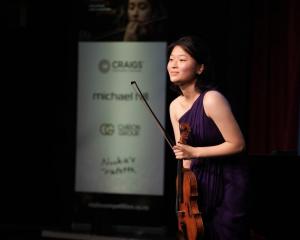For the soloists of the premiere of Gallipoli to The Somme the performance will have extra special meaning. Rebecca Fox discovers World War 1 still resonates today.
In the last six months of his life, Martin Snell's grandfather was plagued by recurrent nightmares about his time in the World War 1 trenches.
He died, aged 94, in Invercargill having never spoken about the war to his family.
Christian Carfrae Lange was just one of many young men who headed off to war, unaware of what was to come.
It is the stories of those young men, their loved ones, those who fought to save them and their enemies that have been pulled together by Dunedin composer Prof Anthony Ritchie in Gallipoli to The Somme.
''I was worried for a long time that I wouldn't do it justice but in the end it is my perspective on it.''
It required a lot of research and consultation with historians and writers to find the material, as Ritchie wanted to include a broad range of experience from the war, including that of the Germans.
''It feels like a collaborative effort.''
The starting point and the name of the work came from Otago Battalion member Alexander Aitkens' book about his war experiences and the incredible journey of his violin.
In tribute, a violin solo by the Dunedin Symphony Orchestra concertmaster Tess Petersen has been included by Ritchie.
The prose of the letters and writings he discovered has been set to music and will be sung by Dunedin-trained singers Martin Snell and Anna Leese, alongside the City Choir Dunedin, augmented by members of the Southern Youth Choir.
The topic resonated with soprano Leese. Her great grandfather was shot in the leg at Gallipoli and spent the rest of his life in pain.
Closer to home, she was also dealing with the news her husband only has two years to live.
''So as a 35-year-old mother, I will soon probably find myself in a situation much like many of the women who wrote these poems, saying goodbye to their husbands as they left for war. So learning this piece has been a difficult process.''
Singing about death and loss - the real death and loss of people who lived through the war - an operatically trained singer needed to be sensitive to the fact it's not an opera, she said.
''In an opera you would normally want to make every emotion larger than life, but I will sing these like tone poems; each one is written by a different person who experienced immense loss. They are painted with finer brush strokes.''
Leese, who studied under Ritchie at the University of Otago, appreciated the efforts of the music professor to ensure the work suited her voice.
For her, the work also marks a ''homecoming'' of sorts as she and her family are preparing to move back down south. She and her husband were married at St Paul's Cathedral last year.
''So it marks the beginning of a new era for us.''
Leese last performed with Snell on the operatic stage, in Tchaikovsky's Evegny Onegin, in Auckland and Wellington in 2009. They played husband and wife - Prince Gremin and Tatijana.
For Snell, who has known Ritchie since their days as foundation members in the New Zealand Youth Choir, it was a ''pleasure and privilege'' to perform a premiere of a Ritchie work - something he has not done in full before.
Given his grandfather's experiences and the experiences of others it was impossible to adequately and meaningfully prepare the content of the new work without referencing that background, he said.
The selection of texts had impressed on him the enormous variety of people from all walks of life affected by the war both in Europe and at home.
''It seems extraordinary to me, even now, after all these years, that such was the patriotic fervour then that mere teenagers travelled incredible distances to defend King and Country.
There was a sense of adventure, excitement and youthful exuberance about joining the war effort to fight against unknown aggressors on distant shores for ingrained principles of freedom.''
Ritchie found the process of putting together the work, which was commissioned by the Dunedin Symphony Orchestra, to be a learning curve as he had grown up in a time when there was a much stronger anti-war sentiment.
He was surprised to discover the reasons behind the war involved many different political events and squabbles that added up to a greater conflict.
''There was an inability to climb back. I think that is one reason it happened - they didn't want to lose face.''
The other surprising discovering was the disparity between what people expected war to be and the reality. Technological advances in weapons meant the war had become monstrous, much more deadly than they had experienced before.
He wanted members of the youth choir to take part as he believed given the age of the soldiers going off to war it was important to have that younger voice involved.
''It's been interesting to see the younger people engaging in commemorating World War 1.''
However, it is not just the devastation and carnage of war he hopes to get across. He also wants to show the human spirit, so some of the texts include images of beauty, of soldiers singing together, of the black humour that got them through.
''It contrasts with the senseless slaughter going on around them.''
To see
Dunedin Symphony Orchestra plays Gallipoli to The Somme, Dunedin Town Hall, October 1.












